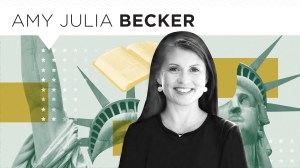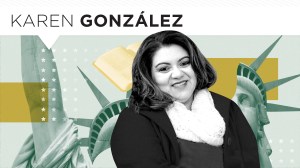In this series


Christianity Today asked a group of contributors how, if at all, the Bible should inform what a nation expects of immigrants. This is one of five essays in the series.
I haven’t seen Gabriela lately, but I used to see her every week. On Saturday mornings, she came to the church food bank where I volunteer as a translator. Visibly pregnant, she would greet me in Spanish with a soft voice and a timid smile. Gabriela was born in Guatemala and came to the United States years ago, but she still speaks no English. Along with her mother and sister, Gabriela cobbles together food stamps and donations from the church food bank to feed her children. As far as I know, the father is out of the picture.
When we think of “good” immigrants—those highly educated, motivated individuals we often want to cherry-pick to make our country better—Gabriela is not who comes to mind. Recent policy changes that restrict participants in public programs like Medicaid or SNAP from applying for green cards suggest that Gabriela drains our resources without contributing anything in return. Many feel America is better off without people like her, no matter the violence she fled or the circumstances of her departure from Guatemala. Her worth is dependent on her economic capacity.
But this logic reflects the economy of this world, not the economy of God’s kingdom. It reduces the give and take of the social fabric to transactional exchanges. That mindset is death not only to our immigrant neighbors, but to all of us. If we accept that economic contribution is the primary prerequisite for living among us, why apply it only to immigrants?
Much has been written about the way Scripture frames the plight of poor immigrants and refugees. The writers of the Hebrew Scriptures consistently advocate for the welfare of the foreigner, admonishing the Hebrew people to remember their former status as alien migrants. But these verses are not simply proof texts; considered in context, they are far more potent than that.
When Jesus asserts the Golden Rule in Luke 10, he is quoting Leviticus 19, a passage of the Law that outlines proper treatment of the foreign-born. It should not come as a surprise that the neighbor to whom Jesus refers in the parable of the Good Samaritan is an outsider. After all, the Levitical dictum to “love your neighbor as yourself” is enshrined within the set of commands to treat the economically destitute migrant as oneself.
Leviticus 19 begins with the words of the Lord: “Be holy because I, the Lord your God, am holy.” He is not vague or mysterious about what holiness entails. Levitical law is as concerned with justice as it is with ritual purity codes, particularly justice that shows no favoritism toward the rich or the established:
Do not reap to the very edges of your field or gather the gleanings of your harvest. … Leave them for the poor and the foreigner. I am the Lord your God. (19:9–10)
Do not pervert justice; do not show partiality to the poor or favoritism to the great, but judge your neighbor fairly. (19:15)
When a foreigner resides among you in your land, do not mistreat them. The foreigner residing among you must be treated as your native-born. Love them as yourself, for you were foreigners in Egypt. I am the Lord your God. (19:33–34)
As Jesus illustrates in his parable, the command to “love your neighbor as yourself” is nestled among a litany of codes for how the people of Israel ought to treat both the native-born and the foreign-born, the economically comfortable and the economically destitute—namely, that they ought to treat them exactly the same.
The United States is not the kingdom of God. But we still have a choice between advocating for policy that increases our personal prosperity at the expense of others, or advocating for policy that furthers the ideas and priorities of Scripture.
As a descendant of Jewish immigrants from Eastern Europe, I am close enough to feel the steep price of the partiality that God decries in Leviticus. Fleeing Russian pogroms and Nazi Germany, several of my cousins sought refuge in America aboard the St. Louis. Though they had a well-founded fear of persecution, they were turned away from US soil. They were poor, they were Jews, they were reviled and discriminated against throughout all of Europe. I have records of one cousin who died in the Holocaust, but of course there were more whose records are lost.
My ancestors were not ideal immigrants. They were desperate—poor in spirit, mourning the countries that had disowned them, meek, and afraid—in other words, the exact kind of person Jesus calls blessed. It’s been said so many times before but is worth saying again: Like the Hebrew people, most of us are descended from refugees and migrants—economic, religious, or otherwise. Like the Hebrew people, in our prosperity we forget the vulnerability and fear our ancestors experienced during their journey. We forget that they were at the receiving end of a welcome that we are now in a position to extend.
Jesus knew that it is easy to love ourselves and those who contribute to our personal prosperity. He didn’t need to waste his words telling us to be self-interested. He spent his words educating us about a different system and telling us how to live within it.
As Christians, we may disagree on immigration policy. But we must resist the temptation to sort complex human beings, all of whom carry life’s difficulties, into economic categories of “good” and “bad.”
After each commandment to honor the foreigner in Leviticus 19, God declares, I am the Lord your God, as if to say, These foreigners, they are not yours to judge. If we fail to hear this, we just might find that God has already invited them to his table, while we were busy adjudicating their worth.
Abigail Storch is a graduate of Eastern University and Yale Divinity School. Originally from Greensboro, North Carolina, she now lives and works in New Haven, Connecticut.













